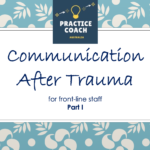Like so many others, I have been feeling devastated by the recent bush fires and the impact of this trauma on our country and people.
So many of our colleagues, family, friends, practices and communities affected.
Readers of my blog would know my own father (who had cancer) died in an bushfire evacuation centre and my niece got trapped in a south coast camping ground and thankfully survived a dreadful asthma attack.
I just got another alert on my phone of strong winds and fire danger.
I’ve had to dig deeper to find sparkle moments lately (one of my favourite strategies I learnt from my trauma psychologist colleague) but what I love about us in health is that the tougher it gets the more we support each other.
The type of support a person receives after trauma can be a part of the healing process
I read a blog by a south coast NSW GP who said “100% of my patients are fire affected, 80% cried…”
I was so moved and worried for her. Then I thought wow 100% of those patients see the front desk staff too! And having worked in practices so long myself I know how much the doctors and nurses need the emotional support of the practice manager too and admin team at times too. I have experienced that wonderful sense of support and sense of community – everyone helping each other though – that’s what we do best don’t you think – especially our rural areas – incredible!
I kept thinking if I was in that medical practice right now, what could I say, what could I do?
So, while I am seeing help for clinicians and patients which is wonderful – the more the better – we decided we would focus on helping our wonderful receptionists and practice managers.
“Elevating your compassionate communication after a traumatic event’.
In searching for any way I could show my support and do something helpful I reached out to my trauma-trained colleagues, soaked up their tips and strategies and asked for their help. They did not hesitate, eager to donate their time and expertise to help others.
Monique Dickerson from Insight Group Facilitation, joined me and we created a free online training module with the following learning objectives:
- Build confidence when working with patients who have experienced trauma
- Understand the impact of trauma on the brain
- Discuss some ideas of what you could say and do to help communicate support for your patients
- Improve support for your community
It is full of practical tips and covers important learning like:
- Empathy vs Sympathy
- What’s helpful
- What’s not helpful
- What could you say
- What could you do
- Sentence starters.
Practice Coach
Anyone who completes the free eLearning course also gets a certificate on completion – big thank you to my wonderful team at #PracticeCoach Australia who will be hosting the free eLearning. Practice Coach (official name The Practice Excellence Institute) is a new not-for-profit entity set up last year with my amazing improvement coach colleagues Dr Tony Lembke, Kim Poyer & Riwka Hagen. This is a sideline business to Train IT Medical and will enable me to provide even more free training and resources and hopefully better support all of you incredible, caring Australian healthcare providers and support teams.
Support for Admin staff
Receptionists often receive minimal training yet play such a crucial role in your healthcare business.
We can all improve our communication skills, especially in relation to stress and trauma.
Every member of the practice team is important.
Continually improving our care and service delivery is vital.
Self-care is vital.
I know I speak for Monique when I say it was an honour for us to donate our time to create this training, just a token of our support and care. There will be more.
Please, please help us by sharing this free eLearning with others working in health:
 http://practicecoach.com.au/course/communication-after-trauma/
http://practicecoach.com.au/course/communication-after-trauma/
Thank you for doing what you do.
Thank you for your support.
Know we are here for you, connect with us, tell us what would help you and your people.
Together we are better.
